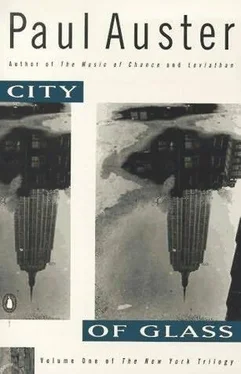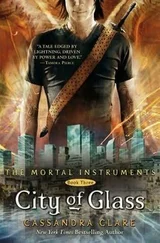Paul Auster - City of Glass
Здесь есть возможность читать онлайн «Paul Auster - City of Glass» весь текст электронной книги совершенно бесплатно (целиком полную версию без сокращений). В некоторых случаях можно слушать аудио, скачать через торрент в формате fb2 и присутствует краткое содержание. Жанр: Современная проза, на английском языке. Описание произведения, (предисловие) а так же отзывы посетителей доступны на портале библиотеки ЛибКат.
- Название:City of Glass
- Автор:
- Жанр:
- Год:неизвестен
- ISBN:нет данных
- Рейтинг книги:5 / 5. Голосов: 1
-
Избранное:Добавить в избранное
- Отзывы:
-
Ваша оценка:
- 100
- 1
- 2
- 3
- 4
- 5
City of Glass: краткое содержание, описание и аннотация
Предлагаем к чтению аннотацию, описание, краткое содержание или предисловие (зависит от того, что написал сам автор книги «City of Glass»). Если вы не нашли необходимую информацию о книге — напишите в комментариях, мы постараемся отыскать её.
City of Glass — читать онлайн бесплатно полную книгу (весь текст) целиком
Ниже представлен текст книги, разбитый по страницам. Система сохранения места последней прочитанной страницы, позволяет с удобством читать онлайн бесплатно книгу «City of Glass», без необходимости каждый раз заново искать на чём Вы остановились. Поставьте закладку, и сможете в любой момент перейти на страницу, на которой закончили чтение.
Интервал:
Закладка:
"But why would Sancho and the others go to all that trouble?"
"To cure Don Quixote of his madness. They want to save their friend. Remember, in the beginning they bum his books of chivalry, but that has no effect. The Knight of the Sad Countenance does not give up his obsession. Then, at one time or another, they all go out looking for him in various disguises-as a woman in distress, as the Knight of the Mirrors, as the Knight of the White Moon-in order to lure Don Quixote back home. In the end, they are actually successful. The book was just one of their ploys. The idea was to hold a mirror up to Don Quixote's madness, to record each of his absurd and ludicrous delusions, so that when he finally read the book himself, he would see the error of his ways.
"I like that."
"Yes. But there's one last twist. Don Quixote, in my view, was not really mad. He only pretended to be. In fact, he orchestrated the whole thing himself Remember: throughout the book Don Quixote is preoccupied by the question of posterity. Again and again he wonders how accurately his chronicler will record his adventures. This implies knowledge on his part; he knows beforehand that this chronicler exists. And who else is it but Sancho Panza, the faithful squire whom Don Quixote has chosen for exactly this purpose? In the same way, he chose the three others to play the roles he destined for them. It was Don Quixote who engineered the Benengeli quartet. And not only did he select the authors, it was probably he who translated the Arabic manuscript back into Spanish. We shouldn't put it past him. For a man so skilled in the art of disguise, darkening his skin and donning the clothes of a Moor could not have been very difficult. I like to imagine that scene in the marketplace at Toledo. Cervantes hiring Don Quixote to decipher the story of Don Quixote himself. There's great beauty to it."
"But you still haven't explained why a man like Don Quixote would disrupt his tranquil life to engage in such an elaborate hoax.
"That's the most interesting part of all. In my opinion, Don Quixote was conducting an experiment. He wanted to test the gullibility of his fellow men. Would it be possible, he wondered, to stand up before the world and with the utmost conviction spew out lies and nonsense? To say that windmills were knights, that a barber's basin was a helmet, that puppets were real people? Would it be possible to persuade others to agree with what he said, even though they did not believe him? In other words, to what extent would people tolerate blasphemies if they gave them amusement? The answer is obvious, isn't it? To any extent. For the proof is that we still read the book. It remains highly amusing to us. And that's finally all anyone wants out of a book-to be amused."
Auster leaned back on the sofa, smiled with a certain ironic pleasure, and lit a cigarette. The man was obviously enjoying himself, but the precise nature of that pleasure eluded Quinn. It seemed to be a kind of soundless laughter, a joke that stopped short of its punchline, a generalized mirth that had no object. Quinn was about to say something in response to Auster's theory, but he was not given the chance. Just as he opened his mouth to speak, he was interrupted by a clattering of keys at the front door, the sound of the door opening and then slamming shut, and a burst of voices. Auster's face perked up at the sound. He rose from his seat, excused himself to Quinn, and walked quickly towards the door.
Quinn heard laughter in the' hallway, first from a woman and then from a child-the high and the higher, a staccato of ringing shrapnel-and then the basso rumbling of Auster's guffaw. The child spoke: "Daddy, look what I found!" And then the woman explained that it had been lying on the street, and why not, it seemed perfectly okay. A moment later he heard the child running towards him down the hall. The child shot into the living room, caught sight of Quinn, and stopped dead in his tracks. He was a blond-haired boy of five or six.
"Good afternoon," said Quinn.
The boy, rapidly withdrawing into shyness, managed no more than a faint hello. In his left hand he held a red object that Quinn could not identify. Quinn asked the boy what it was.
"It's a yoyo," he answered, opening his hand to show him. "I found it on the street.
"Does it work?"
The boy gave an exaggerated pantomime shrug. "Dunno. Siri can't do it. And I don't know how."
Quinn asked him if he could try, and the boy walked over and put it in his hand. As he examined the yoyo, he could hear the child breathing beside him, watching his every move. The yoyo was plastic, similar to the ones he had played with years ago, but more elaborate somehow, an artifact of the space age. Quinn fastened the loop at the end of the string around his middle finger, stood up, and gave it a try. The yoyo gave off a fluted, whistling sound as it descended, and sparks shot off inside it. The boy gasped, but then the yoyo stopped, dangling at the end of its line.
"A great philosopher once said," muttered Quinn, "that the way up and the way down are one and the same."
"But you didn't make it go up," said the boy. "It only went down."
"You have to keep trying."
Quinn was rewinding the spool for another attempt when Auster and his wife entered the room. He looked up and saw the woman first. In that one brief moment he knew that he was in trouble. She was a tall, thin blonde, radiantly beautiful, with an energy and happiness that seemed to make everything around her invisible. It was too much for Quinn. He felt as though Auster were taunting him with the things he had lost, and he responded with envy and rage, a lacerating self-pity. Yes, he too would have liked to have this wife and this child, to sit around all day spouting drivel about old books, to be surrounded by yoyos and ham omelettes and fountain pens. He prayed to himself for deliverance.
Auster saw the yoyo in his hand and said, "I see you've already met. Daniel," he said to the boy, "this is Daniel." And then to Quinn, with that same ironic smile, "Daniel, this is Daniel."
The boy burst out laughing and said., "Everybody's Daniel!"
"That's right," said Quinn. "I'm you, and you're me."
"And around and around it goes," shouted the boy, suddenly spreading his arms and spinning around the room like a gyroscope.
"And this," said Auster, turning to the woman, "is my wife, Siri.
The wife smiled her smile, said she was glad to meet Quinn as though she meant it, and then extended her hand to him. He shook it, feeling the uncanny slenderness of her bones, and asked if her name was Norwegian.
"Not many people know that," she said.
"Do you come from Norway?"
"Indirectly," she said. "By way of Northfield, Minnesota." And then she laughed her laugh, and Quinn felt a little more of himself collapse.
"I know this is sort of last minute," Auster said, "but if you have some time to spare, why don't you stay and have dinner with us?"
"Ah," said Quinn, struggling to keep himself in check. "That's very kind. But I really must be going. I'm late as it is."
He made one last effort, smiling at Auster's wife and waving good-bye to the boy. "So long, Daniel," he said, walking towards the door.
The boy looked at him from across the room and laughed again. "Good-bye myself!" he said.
Auster accompanied him to the door. He said, "I'll call you as soon as the check clears. Are you in the book?"
"Yes," said Quinn. "The only one."
"If you need me for anything," said Auster, "just call. I'll be happy to help."
Auster reached out to shake hands with him, and Quinn realized that he was still holding the yoyo, He placed it in Auster's right hand, patted him gently on the shoulder, and left.
11
QUINN was nowhere now. He had nothing, he knew nothing, he knew that he knew nothing. Not only had he been sent to the beginning, he was now before the beginning, and so far before the beginning that it was worse than any end he could imagine.
Читать дальшеИнтервал:
Закладка:
Похожие книги на «City of Glass»
Представляем Вашему вниманию похожие книги на «City of Glass» списком для выбора. Мы отобрали схожую по названию и смыслу литературу в надежде предоставить читателям больше вариантов отыскать новые, интересные, ещё непрочитанные произведения.
Обсуждение, отзывы о книге «City of Glass» и просто собственные мнения читателей. Оставьте ваши комментарии, напишите, что Вы думаете о произведении, его смысле или главных героях. Укажите что конкретно понравилось, а что нет, и почему Вы так считаете.












